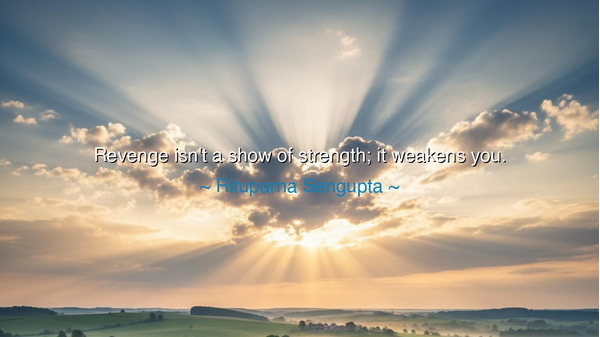
Revenge isn't a show of strength; it weakens you.






Rituparna Sengupta has declared: “Revenge isn’t a show of strength; it weakens you.” These words strike at the heart of one of humanity’s oldest temptations—the desire to repay pain with pain, to answer injustice with equal or greater harm. But Sengupta, like the sages before her, unmasks the lie: revenge does not elevate the soul, it corrodes it. It may feel like victory in the moment, but it leaves behind only emptiness, a hollow triumph that consumes the avenger more than the enemy. True strength lies not in striking back, but in rising above.
The origin of this wisdom is as old as civilization. Across cultures, the great teachers warned of the futility of vengeance. The scriptures say, “Vengeance is mine, saith the Lord,” teaching that justice belongs to a higher power, not to human hands filled with wrath. In the East, the Buddha declared that “Hatred is never ended by hatred, but by love alone.” Sengupta’s words stand in this lineage: a reminder that the cycle of harm is endless unless someone dares to break it, that to seek revenge is to bind oneself forever to one’s oppressor.
History is filled with examples that make this truth clear. Consider the fall of the House of Atreus in Greek tragedy. One murder begot another, and another, until a family was swallowed by blood. Each act of vengeance, meant to show strength, only brought ruin. Contrast this with the figure of Mahatma Gandhi, who led India not through retribution but through nonviolent resistance. Had he chosen revenge, his people might have drowned in war; instead, he transformed a nation’s fate through discipline, patience, and the courage to endure without hatred. Here we see the difference between weakness disguised as strength, and true strength disguised as humility.
Sengupta also reveals a deep psychological truth. When one chooses revenge, they hand their power to the very person who harmed them. Their thoughts, their emotions, their actions—all are dictated by another. In seeking to conquer the enemy, they become the prisoner of their own rage. But when one chooses restraint, forgiveness, or even the simple act of moving forward, they reclaim their freedom. To rise above vengeance is to show mastery not only over others, but over oneself.
This lesson is not only for nations and heroes, but for each of us in daily life. How often do we allow bitterness to guide us? How often do we replay insults, betrayals, and wrongs, dreaming of how we might repay them? Yet every moment spent in this cycle weakens us, just as Sengupta has said. It robs us of peace, drains our joy, and chains us to wounds that should have long healed. To forgive, or at least to release the desire for revenge, is not to excuse evil—it is to free ourselves from its grip.
Think, too, of Nelson Mandela. After decades in prison, he emerged not to seek revenge on those who had humiliated and crushed him, but to build reconciliation. He declared that bitterness would only keep his people enslaved, while forgiveness could set them free. In this we see the fullest expression of Sengupta’s wisdom: revenge weakens, but mercy strengthens; hatred enslaves, but love liberates. Mandela became greater than his oppressors because he chose the higher path.
So let this be the teaching carried forward: revenge is a false crown, glittering but hollow. It tempts us with the illusion of power, but in truth, it leaves us weaker than before. The wise choose a different road: to forgive where possible, to seek justice with fairness, and to let go when holding on only wounds the soul. For the strongest warrior is not the one who strikes hardest, but the one who rules his own heart. And in that mastery, there is no weakness—only the unshakable strength of freedom.






AAdministratorAdministrator
Welcome, honored guests. Please leave a comment, we will respond soon